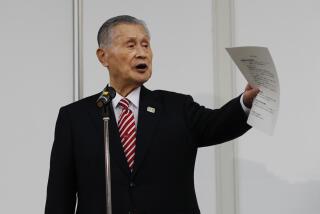Wilson Assails Criticism as ‘Very Stupid’
- Share via
WASHINGTON — Gov. Pete Wilson, sounding more like the Marine infantry officer he once was than the soft-spoken politician familiar to Californians, denounced Japan’s prime minister Monday for his “frankly very stupid and gratuitous” criticism of American workers.
“Bashing by the Japanese of the United States and specifically the American worker is unfair and it simply exacerbates a bad situation,” the governor told reporters outside the White House.
Wilson, here for the annual winter conference of the nation’s governors, had just left a meeting that President Bush held with the state chief executives. The California Republican again had pressed for waivers of federal welfare requirements and come away saying he was encouraged.
Then, standing beside the White House driveway in chilly, mid-40s weather, Wilson used uncommonly heated words about the second high-level Japanese attack in two weeks on the American work ethic.
Prime Minister Kiichi Miyazawa told the Japanese Parliament on Monday that Americans had lost the drive “to live by the sweat of their brow.” Two weeks ago, the Speaker of the lower house of the Parliament, Yoshio Sakurauchi, set off U.S. protests by describing American workers as lazy and partly illiterate.
“This kind of name-calling is stupid and pointless--and dangerous,” Wilson said.
Asked if it was also “racist,” the governor instantly replied: “Bordering on that, yes sir!”
Referring specifically to the prime minister, Wilson said, “I would give him a little advice and that is that he ought to cool it.”
“I think most Americans work very hard, and I think many are very productive,” he added.
Wilson, like Bush and most leading Republicans, is a “free trader” opposed to protective tariffs or any restrictions on imports. But unlike Bush or his own predecessor, former Gov. George Deukmejian, Wilson did not mince words in raising the threat of retaliation against the Japanese for what he characterized as unfair trade practices.
“It’s time for it to end,” Wilson said of the Japanese belittlement of American workers. “And if it continues, it’s going to stimulate . . . recrimination and perhaps retaliation. It’s not very smart. . . .
“I think there’d better be a little restraint, certainly beginning with Mr. Miyazawa and also the Speaker. What I would urge, on our part, is that we be even-handed but damn tough with them in negotiations. . . . If we are not afforded adequate market access of the kind we have afforded to them, then we are justified in taking retaliation.”
Wilson noted that during the mid-1980s, the United States retaliated against Japan for not abiding by an agreement to buy American semi-conductors. Washington effectively blocked imports of a few Japanese goods and “it made the point,” the governor noted.
“We have seen not just the Japanese, but a number of trading partners, be very protectionist,” Wilson continued. “Protectionism is not something we should practice, but neither is it something we should tolerate. And there is a real difference--and a justified difference, a legitimate one--between protectionism and justified retaliation to combat it.”
California has a lot at stake in the U.S.-Japanese trade war. Japan imports more California goods than any other country, $10.3 billion worth in 1990, according to the state trade office. But Californians consume far more Japanese products, though no comparable figures are available, the trade office reported.
California maintains its own trade office in Tokyo.
“The mere fact we’re doing well in some Japanese markets does not excuse the fact that we’re not doing well in others,” asserted Wilson’s trade adviser, Ira Goldman.
BACKGROUND
The flurry of attacks on the American work ethic began Jan. 20 when a Japanese official said U.S. workers are lazy and that 30% of them cannot read. The comments by Yoshio Sakurauchi, Speaker of the House of Representatives, came after President Bush and U.S. business executives visited Japan in a bid to improve trade relations. Tensions grew as Japanese officials appeared to back away from voluntary commitments to buy more American autos and auto parts. Anti-Japanese sentiment has been evident in recent U.S. campaigns to “Buy American.”
More to Read
Get the L.A. Times Politics newsletter
Deeply reported insights into legislation, politics and policy from Sacramento, Washington and beyond. In your inbox twice per week.
You may occasionally receive promotional content from the Los Angeles Times.











